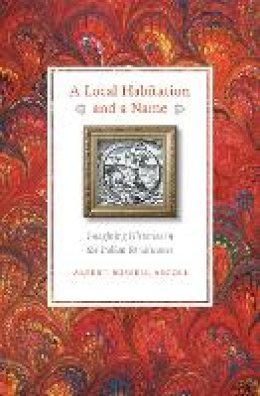10%OFF

Stock image for illustration purposes only - book cover, edition or condition may vary.
A Local Habitation and a Name: Imagining Histories in the Italian Renaissance
Albert Russell Ascoli
€ 45.99
€ 41.56
FREE Delivery in Ireland
Description for A Local Habitation and a Name: Imagining Histories in the Italian Renaissance
Paperback. Examines the unstable dialectic of reality and imagination, as well as of history and literature Num Pages: 384 pages. BIC Classification: 2ADT; DSBB. Category: (P) Professional & Vocational. Dimension: 228 x 158 x 22. Weight in Grams: 536.
Focusing on major authors and problems from the Italian fourteenth and sixteenth centuries, from Petrarch and Boccaccio to Machiavelli, Ariosto and Tasso, A Local Habitation and a Name examines the unstable dialectic of “reality” and “imagination,” as well as of “history” and “literature.” Albert Ascoli identifies and interprets the ways in which literary texts are shaped by and serve the purposes of multiple, intertwined historical discourses and circumstances, and he equally probes the function of such texts in constructing, interpreting, critiquing, and effacing the histories in which they are embedded. Throughout, he poses the theoretical and methodological question of how ... Read more
Show LessProduct Details
Format
Paperback
Publication date
2011
Publisher
Fordham University Press United States
Number of pages
384
Condition
New
Number of Pages
384
Place of Publication
New York, United States
ISBN
9780823234295
SKU
V9780823234295
Shipping Time
Usually ships in 7 to 11 working days
Ref
99-1
About Albert Russell Ascoli
Albert Russell Ascoli is Terrill Distinguished Professor of Italian Studies at the University of California, Berkeley. He has recently published Dante and the Making of a Modern Author.
Reviews for A Local Habitation and a Name: Imagining Histories in the Italian Renaissance
. . . A rich feast . . . in which all students of Italian Renaissance literature will find substantial food for thought.
—Renaissance Quarterly
Combining uncommon erudition with a rigorous commitment to critical theory,Albert Ascoli masterfully illuminates the cultural interlacing of power and knowledge—of “cesare” and “poeta”—in early modern Italy. Whether showing how Petrarch uses his letters ... Read more
—Renaissance Quarterly
Combining uncommon erudition with a rigorous commitment to critical theory,Albert Ascoli masterfully illuminates the cultural interlacing of power and knowledge—of “cesare” and “poeta”—in early modern Italy. Whether showing how Petrarch uses his letters ... Read more
